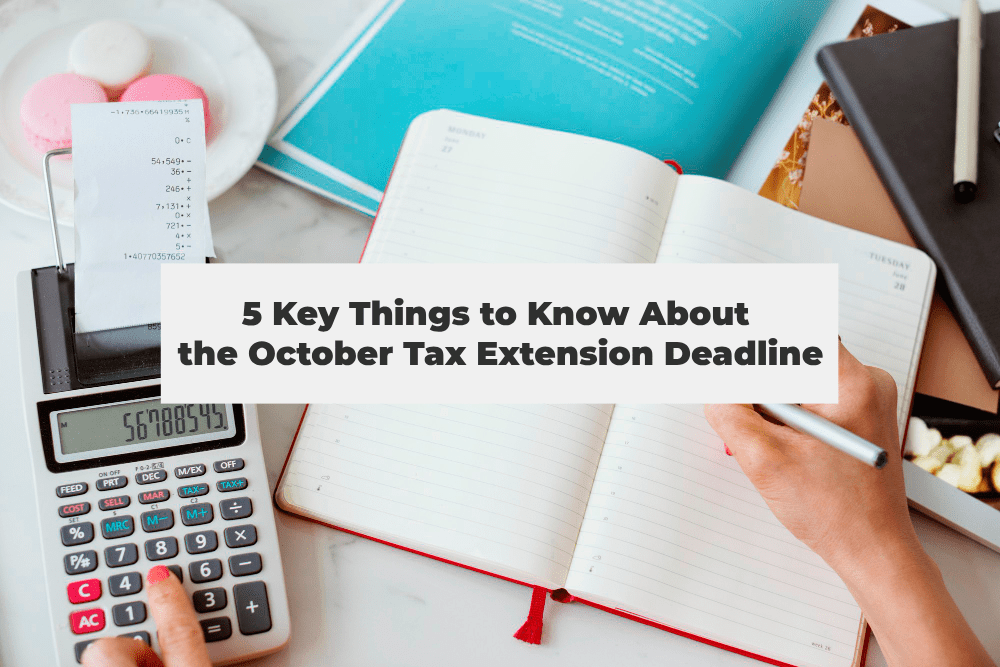For many taxpayers, the October tax extension deadline can sneak up quickly, especially if you filed for an extension earlier in the year. Whether you’re a small business owner, self-employed, or simply needed more time to organize your documents, understanding how the extension works and what you need to do by the deadline is crucial.
In this blog, we’ll walk you through the top five things you need to know about the October Tax Extension deadline, helping you file your taxes with confidence and avoid any penalties.
1. The October Deadline is Final
If you filed for a tax extension back in April, you were granted six extra months to get everything in order. However, the extension only gives you more time to file your return, not to pay any taxes you owe. The October deadline—typically October 15th—is the last day to submit your tax return. There are no more extensions beyond this date, so make sure you’re ready to file by then.
Important Tip: If you miss the October deadline, you may face late-filing penalties, which can add up quickly.
If you need more information on how to request or manage a filing extension, visit the IRS Filing Extension page for detailed guidance.
2. You Must Pay Your Taxes by April 15th
One common misconception is that a Tax Extension also extends the time you have to pay any taxes due. That’s not the case. While the extension gives you more time to file the paperwork, any taxes owed were still due by the original tax deadline in April (usually April 15th). If you didn’t pay your taxes back then, you may have been accumulating interest and penalties since that time.
To avoid further penalties, pay any remaining taxes as soon as possible.
Example: If you owe $5,000 in taxes and didn’t pay by April, the IRS may charge you interest and penalties, which increases the total amount due.
((Image suggestion: A dollar bill and a clock image side by side, symbolizing the link between money owed and time ticking away on interest.))
3. Avoid Common Filing Mistakes
When filing taxes under an extension, it’s important to avoid common mistakes that could delay your return or trigger an audit. Some frequent errors include missing forms, incorrect calculations, or forgetting to sign your return.
Double-check the following before you submit:
- Are all necessary forms included?
- Have you reviewed your calculations?
- Is your return signed and dated?
Tip: Using tax software or working with a professional (like our team at Taxfully) can help ensure your return is accurate and complete.
4. You Can Still E-File
Even if you’re filing close to the October Tax Extension deadline, you can still e-file your tax return. E-filing is a fast, convenient, and secure way to submit your return, and it often results in faster processing times compared to paper filing.
The IRS strongly recommends e-filing, especially for those filing at the last minute, as it reduces the likelihood of errors and delays. Additionally, if you’re expecting a refund, e-filing combined with direct deposit is the quickest way to get your money.
For more details on how to submit your return electronically, check out the IRS E-Filing Options page, which provides step-by-step instructions on how to e-file securely and efficiently.
Important Tip: Double-check your bank account information if you’re expecting a refund through direct deposit to avoid delays.
5. Tax Professionals Can Help, Even at the Last Minute
If you’re feeling overwhelmed by the approaching deadline, know that it’s not too late to seek professional help. Working with a tax professional can help you avoid mistakes, file on time, and possibly reduce your tax liability. They can review your tax situation, make sure you’re claiming all possible deductions, and ensure everything is in order before the deadline.
At Taxfully, we specialize in helping individuals and small business owners navigate complex tax situations. Whether you need help filing or you just have questions about your extension, our team is ready to assist.
Tip: Don’t wait until the last minute to reach out for help, as tax professionals tend to get busier as the deadline approaches.
What Happens if You Miss the October Deadline?
If you miss the October Tax Extension deadline, the IRS may impose hefty penalties. Here’s a breakdown of what to expect:
- Late-Filing Penalty: The penalty for not filing on time is usually 5% of the unpaid taxes for each month your return is late, up to a maximum of 25%.
- Late Payment Penalty: If you didn’t pay your taxes by April, the penalty is 0.5% of your unpaid taxes per month, plus interest.
- Interest Charges: Interest on unpaid taxes continues to accrue from the April deadline until the taxes are paid in full.
Tip: If you missed the deadline but are owed a refund, you won’t face penalties. However, you still need to file your return to claim it.
Conclusion
The October tax extension deadline is a crucial date for those who needed extra time to file their taxes. Keep in mind that while the extension gives you more time to file, it doesn’t extend the time you have to pay any taxes owed. Make sure you file before the deadline, avoid common mistakes, and consider professional help if needed.
If you’re unsure how to proceed or need help filing, the team at Taxfully is here for you. Contact us today to get started and avoid any last-minute stress!




